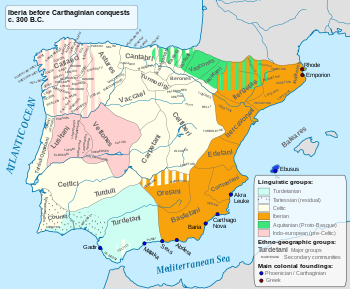
The Celtiberians were a group of Celts and Celticized peoples inhabiting an area in the central-northeastern Iberian Peninsula during the final centuries BCE. They were explicitly mentioned as being Celts by several classic authors. These tribes spoke the Celtiberian language and wrote it by adapting the Iberian alphabet, in the form of the Celtiberian script. The numerous inscriptions that have been discovered, some of them extensive, have allowed scholars to classify the Celtiberian language as a Celtic language, one of the Hispano-Celtic languages that were spoken in pre-Roman and early Roman Iberia. Archaeologically, many elements link Celtiberians with Celts in Central Europe, but also show large differences with both the Hallstatt culture and La Tène culture.

The Cantabri or Ancient Cantabrians, were a pre-Roman people and large tribal federation that lived in the northern coastal region of ancient Iberia in the second half of the first millennium BC. These peoples and their territories were incorporated into the Roman Province of Hispania Tarraconensis in 19 BC, following the Cantabrian Wars.

The Vaccaei or Vaccei were a pre-Roman Celtic people of Spain, who inhabited the sedimentary plains of the central Duero valley, in the Meseta Central of northern Hispania. Their capital was Intercatia in Paredes de Nava.

The Oretani or Oretanii were a pre-Roman ancient Iberian people of the Iberian Peninsula, that lived in northeastern Andalusia, in the upper Baetis (Guadalquivir) river valley, eastern Marianus Mons, and the southern area of present-day La Mancha.

The Lusones were an ancient Celtiberian (Pre-Roman) people of the Iberian Peninsula, who lived in the high Tajuña River valley, northeast of Guadalajara. They were eliminated by the Romans as a significant threat in the end of the 2nd century BC.

The Autrigones were a pre-Roman tribe that settled in the north of the Iberian Peninsula, in what today is the western Basque Country and northern Burgos and the East of Cantabria, Spain. Their territory limited with the Cantabri territory at west, the Caristii at east, the Berones at the southeast and the Turmodigi at the south. It is discussed whether the Autrigones were Celts, theory supported by the existence of toponyms of Celtic origin, such as Uxama Barca and other with -briga endings and that eventually underwent a Basquisation along with other neighboring tribes such as the Caristii and Varduli.

The Carpetani were one of the Celtic pre-Roman peoples of the Iberian Peninsula, akin to the Celtiberians, dwelling in the central part of the meseta - the high central upland plain of the Iberian Peninsula.

The Arevaci or Aravaci, were a Celtic people who settled in the central Meseta of northern Hispania and dominated most of Celtiberia from the 4th to late 2nd centuries BC. The Vaccaei were their allies.

The Lobetani, were a small pre-Roman Iberian people of ancient Spain mentioned only once by Ptolemy in the 2nd century AD, situated around the mountainous Albarracín area of the southwest Province of Teruel.

The Turboletae or Turboleti were an obscure pre-Roman people from ancient Spain, which lived in the northwest Teruel province since the early 3rd Century BC.

The Olcades were an ancient stock-raising pre-Roman people from Hispania, who lived to the west of the Turboletae in the southeastern fringe of the Iberian system mountains.

The Turmodigi were a pre-Roman ancient people, later mixed with the Celts people of northern Spain who occupied the area within the Arlanzón and Arlanza river valleys in the 2nd Iron Age.

The Germani were an obscure pre-Roman ancient people of the Iberian Peninsula which settled around the 4th century BC in western Oretania, an ancient region corresponding to the south of Ciudad Real and the eastern tip of Badajoz provinces.

The Berones were a pre-Roman Celtic people of ancient Spain, although they were not part of the Celtiberians, they lived north of the Celtiberians and close to the Cantabrian Conisci in the middle Ebro region between the Tirón and Alhama rivers.

The Titii or Tithii were a small and obscure Celtiberian people, whose lands were located along the middle Jalón and upper Tajuña valleys, somewhere between Alhama de Aragón in Zaragoza and Molina de Aragón in Guadalajara provinces.

The Pellendones were an ancient pre-Roman Celtic people living on the Iberian Peninsula. From the early 4th century BC they inhabited the region near the source of the river Duero in what today is north-central Spain. The area comprises the north of Soria, the southeast of Burgos and the southwest of La Rioja provinces.

The Belli, also designated Beli or Belaiscos were an ancient pre-Roman Celtic Celtiberian people who lived in the modern Spanish province of Zaragoza from the 3rd Century BC.

The Cratistii were an ancient pre-Roman, stock-raising people whose lands were situated along the upper Tagus valley, in the elevated plateau region of the western Cuenca and northeast Province of Teruel.

The Allotriges or Allotrigones, were a small 'Celticized' mountain people mentioned alongside the Plentauri by Strabo, as inhabitants of the region roughly corresponding to present-day northwestern La Rioja, around the area of the Ebro sources.
The Celtiberian confederacy was a tribal federation formed around the mid-3rd century BC, by the Arevaci, Lusones, Belli and Titii, with the Arevacian city of Numantia as the federal capital.



